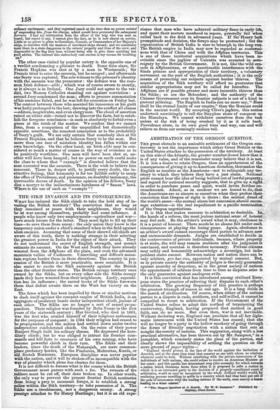ARBITRATION OF THE OREGON QUESTION.
THE great obstacle to an amicable settlement of the Oregon con- troversy is not the importance which either Great Britain or the United States attaches to the possession of the territory. At least on this side of the Atlantic, the greater number donot know that it is of any value, and of the remainder many believe that it is not. It is less a desire to retain Oregon, than an apprehension of the consequences of giving it up to American dictation, thatmakes the English as resolute as the Americans—not to relinquish any ter- ritory to which they believe they have a just claim. National pride cannot bear the idea of being bullied out of lawful property; and regard for national security suggests, that to give up a right in order to purchase peace and quiet, would invite further en- croachments. Admit, as in candour we are bound to do, that the Americans are as sincere as ourselves when they profess their conviction that Oregon of right is theirs : the mutual dread of the world's sneer—the mutual alarm lest concession should encou- rage extortion—is the real impediment to a pacific termination of the Oregon negotiations. It is this that makes recourse to arbitration so desirable. In.
the hands of a referee, the most jealous national sense of honour may feel safe. Be the arbiter's award what it may, obedience to it is a point of honour. There needs be no shame felt under such circumstances at playing the losing game. Again, obedience to an arbiter's award cannot encourage third parties to advance new and unreasonable demands. Judges are established to decide in the controversies of private individuals, because, where property is at stake, the mill may remain stubborn after the judgment is convinced, and coercion is therefore necessary. Private citizens may safely and honourably acknowledge a sovereign, but inde- pendent states cannot. Between nation and nation there can be only arbiters, pro lade vice, appointed by mutual consent. But, as in private society the authority. of judges is the only guarantee against anarchy or despotism, so in the great society of nations the appointment of arbiters-from time to time as disputes arise is the only guarantee against analogous evils. It is this conviction that has introduced among civilized Euro-, peen states the practice of referring their disputes to each other's arbitration. The growing frequency of this practice is perhaps the greatest triumph of reason in our age. It is a long stride in the march of civilization. Of course, when either of the nations parties to a dispute is rude, stubborn, and self-willed, it cannot be compelled to resort to arbitration. If the Government of the United States refuse to adopt this method of terminating the controversy, England, having proposed that method in good faith, can do no more. But even then, war is not inevitable. Without declaring war England can proclaim that all her diplo- matic intercourse with the United States has ceased; that she will no longer be a party to the hollow mockery of going through the forms of friendly negotiation with a nation that sets at nought the comity of nations. This suggestion, along with a less practical alternative, has been thrown out by dr. Sampson,* in a pamphlet, which concisely states the pleas of the parties, and clearly shows the impossibility of settling the question on the mere ground of paper rights— "England should protest in the face of the world against the barbarism of America, and at the same time treat that country as one with whom no relations whatever could be held. Without interfering with the private intercourse of the individuals of both nations, she could refuse to receive an American Minister at her court; and this pacific but determined step (the necessity for which towards a nation which threatens brute force when it is proposed to refer a matter in which it is an interested party to the decision of aproperly-constituted court of arbitration, would at once be recognized by the whole civilized world) would, by rendering persons unwilling to settle in a country which had thus been put out of the pale of intercourse with the le.ding nations of the earth, soon convey a lessen leading to a wiser course."
'" "The Oregon Question as it Stands. By IL B. Sampson." Published by Ilighley, Fleet Street.


























 Previous page
Previous page